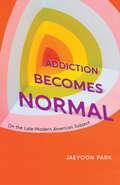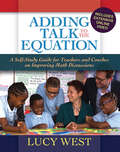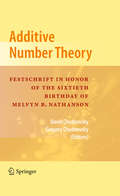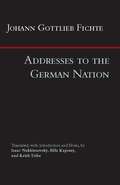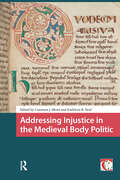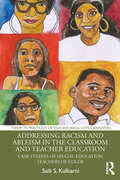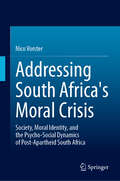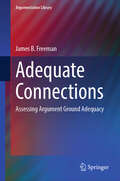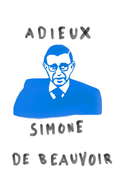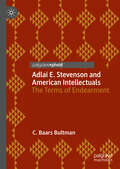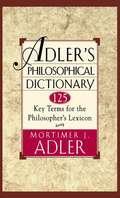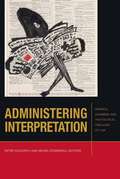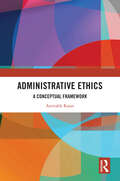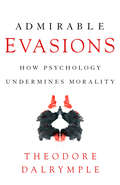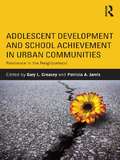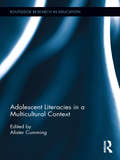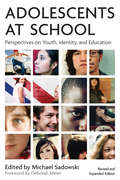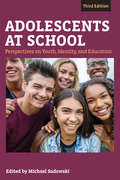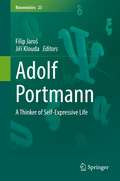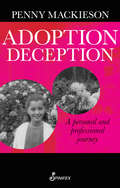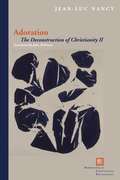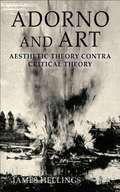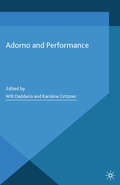- Table View
- List View
Addiction Becomes Normal: On the Late-Modern American Subject
by Jaeyoon ParkAddiction is now seen as an ordinary feature of human nature, an idea that introduces new doubts about the meaning of our desires. Over the last forty years, a variety of developments in American science, politics, and culture have reimagined addiction in their own ways, but they share an important understanding: increasingly, addiction is described as normal, the natural result of a body that has been exposed to potent stimuli. This shift in thinking suggests that addiction is a condition latent in all of us, a common response to a society rich in thrills. In Addiction Becomes Normal, Jaeyoon Park provides a history and critical analysis of the normalization of addiction in late-modern American society. By exploring addiction science, diagnostic manuals, judicial reform, and public health policy, he shows how seeing addiction as normal has flourished in recent decades and is supported throughout cultural life in the United States by the language of wellness, psychotherapy, and more. Building on Michel Foucault’s depiction of the human figure, Park argues that this shift reflects the emergence of a new American subject, one formed by the accretion of experiences. This view of the human subject challenges the idea that our compulsions reflect our characters, wills, or spirits. For if addiction is an extreme but ordinary attachment, and if compulsive consumption resembles healthy behavior, then desire is no longer an expression of the soul so much as the pursuit of a past reward. A perceptive work of recent history and political theory, Addiction Becomes Normal raises new questions about what it means to be human in America today.
Adding Talk To The Equation: A Self-Study Guide for Teachers and Coaches on Improving Math Discussions
by Lucy WestFor more than 20 years, Lucy West has been studying mathematical classroom discourse. She believes that teachers need to understand what their students are thinking as they grapple with rich mathematical tasks and that the best way to do so is through talking and listening. In this video-rich edition of Adding Talk to the Equation: Discussions and Discovery in Mathematics, she invites teachers into real-life classrooms where all students stay in the game, stay motivated about learning, and ultimately deepen their understanding. Designed for math teachers and coaches in grades 18, this self-study guide showcases elementary and middle school classrooms where teachers inspire even the most reluctant students to share their ideas. Through the stories of skilled teachers, West offers play-by-play commentary as they get more comfortable with new talk moves and learn to tune in and respond to students' math conversations. Although these discussions occur in math class, the strategies can be used to create a respectful, productive environment for any subject area. This video-based resource examines the importance of creating a safe learning environment; the value of thinking, reasoning, and questioning; the role of active, accountable listening; and the necessity of giving all students a you can do this message. West also emphasizes that slowing down, even in the face of time constraints, is crucial for creating a classroom where all students feel they have something to contribute. This guide includes transcripts of the case studies, with insightful commentary from West that gives you a window into her thinking and the complexities of the work she is doing with teachers, as well as her reflections on missed opportunities.
Additive Number Theory: Festschrift In Honor of the Sixtieth Birthday of Melvyn B. Nathanson
by David Chudnovsky Gregory ChudnovskyThis impressive volume is dedicated to Mel Nathanson, a leading authoritative expert for several decades in the area of combinatorial and additive number theory. For several decades, Mel Nathanson's seminal ideas and results in combinatorial and additive number theory have influenced graduate students and researchers alike. The invited survey articles in this volume reflect the work of distinguished mathematicians in number theory, and represent a wide range of important topics in current research.
Addresses to the German Nation
by Keith Tribe Isaac Nakhimovsky Bela Kapossy Johann Gottlieb FichteIn the winter of 1807, while Berlin was occupied by French troops, the philosopher Johann Gottlieb Fichte presented fourteen public lectures that have long been studied as a major statement of modern nationalism. Yet Fichte's Addresses to the German Nation have also been interpreted by many as a vision of a cosmopolitan alternative to nationalism.This new edition of the Addresses is designed to make Fichte's arguments more accessible to English-speaking readers. The clear, readable, and reliable translation is accompanied by a chronology of the events surrounding Fichte's life, suggestions for further reading, and an index. The groundbreaking introductory essay situates Fichte's theory of the nation state in the history of modern political thought. It provides historians, political theorists, and other students of nationalism with a fresh perspective for considering the interface between cosmopolitanism and republicanism, patriotism and nationalism.
Addressing Injustice in the Medieval Body Politic (Crossing Boundaries: Turku Medieval and Early Modern Studies)
by Constant J. Mews Kathleen B. NealJustice and injustice were subjects of ongoing debate in medieval Europe. Received classical and biblical models both influenced how these qualities of moral and political life were perceived, discussed and acted upon. Important among these influences was the anonymous seventh-century Irish text, On The Twelve Abuses of the Age, a biblically-inspired discussion of the moral duties particular to each sector of society. This volume probes its long influence, and its interaction with the revival of classical ideas. By bringing together scholars of political thought and practice, in lay and religious contexts spanning the seventh to fourteenth centuries, this volume crosses boundaries of periodisation, discipline and approach to reflect upon the medieval evolution of concepts of injustice and means of redress. Contributions address how ideas about justice and injustice were discussed among scholars and theologians, and how those ideas were translated into action through complaint and advice throughout the medieval period. Crosses conventional chronological boundaries by dealing with both early and high/later medieval periods. Focuses on the influence of a widely copied but largely unstudied text, 'The Twelve Abuses of the Age' with a multi-national and multi-disciplinary focus, involving disciplines of literature, history and political thought.
Addressing Racism and Ableism in the Classroom and Teacher Education: Case Studies of Special Education Teachers of Color (Theory to Practice in Critical and Social Justice Education)
by Saili S. KulkarniAddressing Racism and Ableism in the Classroom and Teacher Education centers and elevates narratives of special education teachers of color, an overlooked and underserved population in public education, as a vehicle for analyzing the tensions of race and disability. Special education teachers of color, who work and may themselves live at the intersections of these complex identity constructs, are uniquely positioned to develop effective approaches to countering racism and ableism. This book offers five critical case studies of special education teachers of color, whose replicable practices span preschool through high school classrooms while also holding urgent implications for teacher education programs. Building toward an original framework that synthesizes DisCrit and Culturally Sustaining Pedagogies, these narratives refuse deficit readings of disability among students of color and instead prepare teachers to model collective joy and pride in their identities.
Addressing South Africa's Moral Crisis: Society, Moral Identity, and the Psycho-Social Dynamics of Post-Apartheid South Africa
by Nico VorsterThis book attempts to understand and address the psycho-social dynamics behind South Africa&’s moral crisis. It describes South Africa as afflicted by state capture, violence, corruption, and the looting of state infrastructure thirty years after the establishment of democracy. It then provides a holistic, social diagnosis of this problem that integrates the findings of different disciplines into an overall picture of the forces at work in South Africa's collective moral decline. Ultimately, this book engages with the deeper psycho-social phenomena behind South Africa&’s moral decline, arguing that the diagnostic question of why this moral decline has taken place must be answered before turning to the normative question of what ought to happen in this situation. Accordingly, this book explores themes regarding the innate moral capacities of the human person, the effects of need pressures and systemic pressures on ethical decision-making, and the phenomena of distorted motivational drives and distorted behavioral responses. It shows how the framing of virtue-centered moral identities might act as buffers against moral disengagement strategies and assist in promoting pro-social behavior. It then specifies the macro-social changes required to create such an ethical-social climate. The book is of interest to social scientists, ethicists, behavioral scientists, educators, theologians, and moral philosophers. In the end, this case study of South Africa shows us more broadly how maintaining public morality and social cohesion is a challenge that most modern societies face.
Adequate Connections: Assessing Argument Ground Adequacy (Argumentation Library #38)
by James B. FreemanThis book presents a comprehensive picture of when the premises of an argument are adequately connected to its conclusion. The author draws upon the familiar Toulmin model, Rescher’s discussion of presumption and burden of proof, and L. Jonathan Cohen’s presentation of the method of relevant variables. The book first assesses the warrant or inference rule connecting the premises to the conclusion. To analyzes this, the author asks a series of questions such as - should the warrant be evaluated by conclusive or defeasible standards? Does the argument require that its premises, if acceptable, guarantee that the conclusion is acceptable also or does it allow the premises just to present a body of relevant evidence? Is the inference rule backed or supported a priori or a posteriori? These distinctions form four categories of warrants: conclusive a priori, defeasible a posteriori, defeasible a priori, and virtually conclusive a posteriori. The warrants in each category are evaluated differently for how strongly the premises support the conclusion of arguments instancing those warrants. After presenting the rationale for this division and discussing our nonprobabilistic approach, the author analyzes the connection adequacy for each of these types of warrants. This book is of interest to scholars of argumentation theory.
Adieux
by Simone De BeauvoirSimone de Beauvoir's account of the last ten years of Jean-Paul Sartre's life provides a focus for understanding one of the greatest thinkers of the twentieth century. But the book, consisting of both a year-by-year account of Sartre's last decade and a conversation between him and de Beauvoir about his life and work, is more than just a philosophical examination. It is also a personal dialogue of astonishing frankness that illuminates one of the most famous and complex relationships of the twentieth century.From the Trade Paperback edition.
Adlai E. Stevenson and American Intellectuals: The Terms of Endearment
by C. Baars BultmanThis book focuses on a biographical and cultural rendering of Adlai E. Stevenson's alliance with a segment of the intellectual community, with primary attention to the years from 1940 to his death in 1965. At the core of the study is an evaluation of the nature of a relationship that was important both to intellectuals, particularly literary intellectuals, and to Stevenson. This volume exhibits case studies which illumine the alliance through a view of Stevenson's relations with American writers Archibald MacLeish and John Steinbeck.
Adler's Philosophical Dictionary
by Mortimer J. AdlerThe terms and concepts that have simulated thinkers from Aristotle onward come to life in the latest work by the man TIME magazine has called "America's philosopher for everyman". Is the human soul immortal? What does it mean to know something? What is the nature of erotic love? Adler examines these questions as well as many others with his trademark clarity, rigor, and common sense.
Administering Interpretation: Derrida, Agamben, and the Political Theology of Law (Just Ideas)
by Peter Goodrich and Michel RosenfeldPopulism in politics and policy orientations in law have thrown the jurisdiction of the academy and the disciplines of interpretation into disarray. Critique flounders in abstraction and negativity, law loses itself in particularity. Administering Interpretation brings together philosophers, humanists, and jurists from both continental and Anglophone jurisdictions to reassess the status and trajectory of interpretative theory as applied in the art of law. Tracking the thread of philosophical influences upon the community of legal interpretation, the essays move from the translation and wake of Derrida to the work of Agamben, from deconstruction to oikononmia. Sharing roots in the philological excavation of the political theology of modern law, contributors assess the failure of secularism and the continuing theological borrowings of juridical interpretation. The book brings contemporary critique to bear upon the interpretative apparatuses of exclusion, the law of spectacular sovereignty, and the bodies that lie in its wake.Contributors: Giovanna Borradori, Marinos Diamantides, Allen Feldman, Stanley Fish, Pierre Legrand, Bernadette Meyler, Michel Rosenfeld, Bernhard Schlink, Jeanne Schroeder, Laurent de Sutter, Katrin Trüstedt, Marco Wan
Administrative Ethics: A Conceptual Framework
by Amitabh RajanThis insightful book explores the use and application of ethics in contemporary governance and suggests necessary reforms. Following an interdisciplinary approach involving the fields of political science, law, economics, sociology, management, and philosophy, this book analyses their applicability and usefulness in everyday practices in governance, covering its five cardinal virtues—prudence, transparency, discourse, justice, and accountability. Highlighting ethical challenges in aspects of status recognition, oppression, empowerment, social care, public financing, environment protection and others in today’s interconnected world, it delves into the dynamics of administrative power in democracies and showcases how the misuse of power can be controlled through a discourse of ethics in law and governance. The book will be useful to the students, researchers and teachers of public administration, philosophy, political Science, corporate ethics, and governance other related social sciences disciplines. The book will also be an indispensable companion to social activists, advocacy groups, journalists and civil society institutions and public service training institutions.
Admirable Evasions
by Theodore DalrympleIn Admirable Evasions, Theodore Dalrymple explains why human self-understanding has not been bettered by the false promises of the different schools of psychological thought. Most psychological explanations of human behavior are not only ludicrously inadequate oversimplifications, argues Dalrymple, they are socially harmful in that they allow those who believe in them to evade personal responsibility for their actions and to put the blame on a multitude of scapegoats: on their childhood, their genes, their neurochemistry, even on evolutionary pressures.Dalrymple reveals how the fashionable schools of psychoanalysis, behaviorism, modern neuroscience, and evolutionary psychology all prevent the kind of honest self-examination that is necessary to the formation of human character. Instead, they promote self-obsession without self-examination, and the gross overuse of medicines that affect the mind.Admirable Evasions also considers metaphysical objections to the assumptions of psychology, and suggests that literature is a far more illuminating window into the human condition than psychology could ever hope to be.
Adolescent Development and School Achievement in Urban Communities: Resilience in the Neighborhood
by Patricia A. Jarvis Gary L. CreaseyThis timely volume explores essential themes, issues, and challenges related to adolescents’ lives and learning in underserviced urban areas. Distinguished scholars provide theoretically grounded, multidisciplinary perspectives on contexts and forces that influence adolescent development and achievement. The emphasis is on what is positive and effective, what can make a real difference in the lives and life chances for urban youths, rather than deficits and negative dysfunction. Going beyond solely traditional psychological theories, a strong conceptual framework addressing four domains for understanding adolescent development undergirds the volume: developmental continuities from childhood primary changes (biological, cognitive, social) contexts of development adolescent outcomes. A major federal government initiative is the development of programs to support underserviced urban areas. Directly relevant to this initiative, this volume contributes significantly to gaining a realistic understanding of the contexts and institutions within which urban youths live and learn.
Adolescent Literacies in a Multicultural Context (Routledge Research in Education)
by Alister CummingThis book presents results from a four-year project addressing the central question: What factors, challenges, and contexts contribute to and constrain literacy achievement among at-risk adolescent learners with culturally diverse backgrounds? Researchers consider the importance of several, interrelated factors that support the development of adolescents’ literacies in multilingual contexts: support from educators, community groups, families, and peers; recognition of the multi-faceted complexity of literacy through multiple, complementary methods of research and assessment; approaches to pedagogy that engage learners’ zones of proximal development in humanistic and purposeful ways; and promoting students’ vocabulary knowledge, strategies for reading, writing, and learning, and orientations to engaging with epistemic purposes of literacy critically, through multiple media, and with self-confidence.
Adolescents at School, Second Edition: Perspectives on Youth, Identity, and Education (Youth Development And Education Ser.)
by Michael SadowskiAs any teacher or parent knows, adolescence is a time when youth grapple with the question, &“Who am I?&” Issues of race, ethnicity, class, gender, sexual orientation, and ability can complicate this question for young people, affecting their schoolwork and their relationships with teachers, family, and peers. This new edition of Adolescents at School builds and expands the strengths and insights of the much-acclaimed first edition. Drawing from the perspectives of teachers, researchers, and administrators—and adolescents themselves—it examines the complex, changing identities young people manage while they confront the challenges of schools. A uniquely practical, insightful, and jargon-free volume, Adolescents at School points to ways to foster the success of every student in our schools and classrooms.
Adolescents at School, Third Edition: Perspectives on Youth, Identity, and Education (Youth Development and Education Series)
by Michael SadowskiAdolescents at School brings together the perspectives of scholars, educators, and researchers to address the many issues that affect adolescents&’ emerging identities, especially in relation to students&’ experience of and engagement with school. The book offers current and preservice teachers a practical understanding of the concept of identity development, particularly as impacted by such factors as race, ethnicity, gender, sexual orientation, ability/disability, immigration, and social class.This third edition includes new chapters on boys&’ emotional lives, risk and resilience in girls, the experiences of undocumented immigrant students, Muslim-American youth, and income inequality; features on &“teaching while white&”; and an extensively updated chapter on LGBTQ+ students. The book expands on the strengths and insights of the previous editions while also touching on issues highly relevant to contemporary youth such as social media, youth activism, and immigration.A practical and insightful volume, Adolescents at School points to ways to foster the success of every student in our schools and classrooms.
Adolescents at School: Perspectives on Youth, Identity, and Education
by Deborah Meier Michael SadowskiAs any teacher or parent knows, adolescence is a time when youth grapple with the question, “Who am I?” Issues of race, ethnicity, class, gender, sexual orientation, and ability can complicate this question for young people, affecting their schoolwork and their relationships with teachers, family, and peers. This new edition of Adolescents at School builds and expands the strengths and insights of the much-acclaimed first edition. Drawing from the perspectives of teachers, researchers, and administrators—and adolescents themselves—it examines the complex, changing identities young people manage while they confront the challenges of schools. A uniquely practical, insightful, and jargon-free volume, Adolescents at School points to ways to foster the success of every student in our schools and classrooms.
Adolf Portmann: A Thinker of Self-Expressive Life (Biosemiotics #23)
by Filip Jaroš Jiří KloudaThis edited volume is the first specialized book in English about the Swiss zoologist and anthropologist Adolf Portmann (1897-1982). It provides a clarification and update of Portmann’s theoretical approach to the phenomenon of life, characterized by terms such as “inwardness” and “self-presentation.” Portmann’s concepts of secondary altriciality and the social uterus have become foundational in philosophical anthropology, providing a benchmark of the difference between humans and animals. In its content, this book brings together two approaches: historical and philosophical analysis of Portmann’s studies in the life sciences and application of Portmann’s thought in the fields of biology, anthropology, and biosemiotics. Significant attention is also paid to the methodological implications of his intended reform of biology. Besides contributions from contemporary biologists, philosophers, and historians of science, this volume also includes a translation of an original essay by Portmann and a previously unpublished manuscript from his most remarkable English-speaking interpreter, philosopher Marjorie Grene. Portmann’s conception of life is unique in its focus on the phenomenal appearance of organisms. Confronted with the enormous amount of scientific knowledge being produced today, it is even clearer than it was during Portmann’s lifetime that although biologists employ physical and chemical methods, biology itself is not (only) physics and chemistry. These exact methods must be applied according to what has meaning for living beings. If biology seeks to understand organisms as autonomous agents, it needs to take display and the interpretation of appearances as basic characteristics of life. The topic of this book is significantly relevant to the disciplines of theoretical biology, philosophy, philosophical anthropology, and biosemiotics. The recent epigenetic turn in biology, acknowledging the interconnections between organismal development, morphology and communication, presents an opportunity to revisit Portmann’s work and to reconsider and update his primary ideas in the contemporary context.
Adoption Deception: A Personal and Professional Journey
by Penny MackiesonHave you ever wondered how it might feel to have been adopted in Australia during the pre-1980s era in which vulnerable young mothers were coerced into relinquishing their babies? How it might feel to have grown up, become a social worker and worked with vulnerable children and families? This book provides answers to those difficult questions. Adoption Deception presents the personal and professional reflections of Penny Mackieson, an Australian adoptee and social worker, on issues associated with adoption - many of which are shared with donor conception and surrogacy. For anyone with an experience of or interest in adoption, whether personal or professional, who is open to perspectives other than those selectively portrayed by populist mainstream media, this book will provide invaluable insights.
Adoration: The Deconstruction of Christianity II (Perspectives in Continental Philosophy)
by Jean-Luc NancyThis second volume in Nancy’s The Deconstruction of Christianity explores the stance or bearing that would be appropriate for us now, in the wake of the dis-enclosure of religion and the retreat of God: that of adoration. Adoration is stretched out toward things, but without phenomenological intention. In our present historical time, we have come to see relation itself as the divine. The address and exclamation--the salut!--that constitutes adoration celebrates this relation: both the relation among all beings that the world is and what is beyond relation, the outside of the world that opens us in the midst of the world.A major contribution to the contemporary philosophy of religion, Adoration clarifies and builds upon not only Dis-Enclosure, the first volume in this project, but also Nancy’s other previous writings on sense, the world, and the singular plurality of being.
Adorno and Art
by James HellingsA comprehensive, critical and accessible account of Theodor W. Adorno's materialist-dialectical aesthetic theory of art from a contemporary perspective, this volume shows how Adorno's critical theory is awash with images crystallising thoughts to such a degree that it has every reason to be described as aesthetic.
Adorno and Existence
by Peter E. GordonAdorno was forever returning to the philosophies of bourgeois interiority, seeking the paradoxical relation between their manifest failure and their hidden promise. As Peter E. Gordon shows, Adorno's writings on Kierkegaard, Husserl, and Heidegger present us with a photographic negative--a philosophical portrait of the author himself.
Adorno and Performance (Performance Philosophy)
by Will Daddario Karoline GritznerAdorno and Performance offers the first comprehensive examination of the vital role of performance within the philosophy of Theodor W. Adorno. Capacious in its ramifications for contemporary life, the term 'performance' here unlocks Adorno's dialectical thought process, which aimed at overcoming the stultifying uniformity of instrumental reason.
